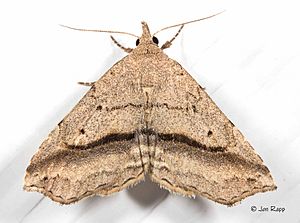Buttonbush owlet facts for kids
Quick facts for kids Buttonbush owlet |
|
|---|---|
 |
|
| Scientific classification | |
| Genus: |
Ledaea
|
| Species: |
perditalis
|
| Synonyms | |
|
|
The buttonbush owlet or lost owlet moth (scientific name: Ledaea perditalis) is a type of moth. It belongs to a large family of moths called Erebidae. This moth was first officially described by a scientist named Francis Walker in 1859.
Contents
All About the Buttonbush Owlet Moth
This moth is known by two common names: the buttonbush owlet and the lost owlet moth. It's a fascinating insect found across a wide area of North America.
What Does It Look Like?
The buttonbush owlet moth is a medium-sized moth. Its wingspan (how wide it is from one wingtip to the other) is usually between 23 and 26 millimeters. That's about the length of a small paperclip!
Where Does It Live?
You can find the buttonbush owlet moth in many parts of North America. It lives in the Great Lakes states, like Michigan and Wisconsin. It also lives in Quebec in Canada and northern New England in the United States. From there, its home stretches south all the way to Florida and Texas.
Life Cycle of the Moth
Like all moths, the buttonbush owlet moth goes through several stages in its life.
From Egg to Adult
Adult moths are usually seen flying around from April to August in warmer southern areas. In the cooler northern regions, they fly from May to August. These moths can have one to three generations each year. This means that new groups of moths can hatch and grow up multiple times in a single year.
What Do They Eat?
The young moths, called larvae (or caterpillars), have a special diet. They mostly eat the leaves of certain plants. Their favorite plants are Cephalanthus species, which are also known as buttonbush plants. They also like to munch on Scirpus cyperinus, which is a type of plant called woolgrass.
Who Discovered This Moth?
The buttonbush owlet moth was first described by Francis Walker in 1859. When a species is "described," it means a scientist has studied it carefully. They give it a scientific name and write down all its features. This helps other scientists and people learn about new animals and plants.

